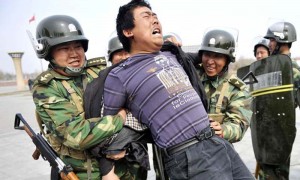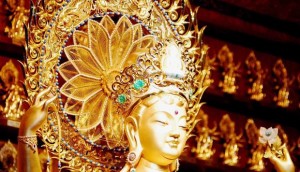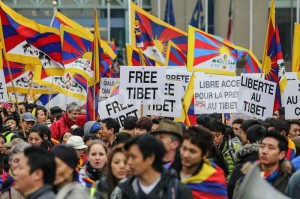Acceptance of the Rights of Others
Human Rights Watch – World Report 2014
Rapid socio-economic change in China has been accompanied by relaxation of some restrictions on basic rights, but the government remains an authoritarian one-party state. It places arbitrary curbs on expression, association, assembly, and religion; prohibits independent labor unions and human rights organizations; and maintains Party control over all judicial institutions.
The government censors the press, the Internet, print publications, and academic research, and justifies human rights abuses as necessary to preserve “social stability.” It carries out involuntary population relocation and rehousing on a massive scale, and enforces highly repressive policies in ethnic minority areas in Tibet, Xinjiang, and Inner Mongolia. Though primary school enrollment and basic literacy rates are high, China’s education system discriminates against children and young people with disabilities. The government obstructs domestic and international scrutiny of its human rights record, insisting it is an attempt to destabilize the country.
At the same time, citizens are increasingly prepared to challenge authorities over volatile livelihood issues, such as land seizures, forced evictions, environmental degradation, miscarriages of justice, abuse of power by corrupt cadres, discrimination, and economic inequality. Official and scholarly statistics, based on law enforcement reports, suggest there are 300-500 protests each day, with anywhere from ten to tens of thousands of participants. Despite the risks, Internet users and reform-oriented media are aggressively pushing censorship boundaries by advocating for the rule of law and transparency, exposing official wrongdoing, and calling for political reforms.
Civil society groups and advocates continue to slowly expand their work despite their precarious status, and an informal but resilient network of activists monitors and documents human rights cases as a loose national “weiquan” (rights defense) movement. These activists endure police monitoring, detention, arrest, enforced disappearance, and torture.
Human Rights Council adopts Universal Periodic Review for China
Wu Hailong, Permanent Representative of China to the United Nations Office at Geneva, said that China accorded great importance to the recommendations made and would accept any recommendation that was suitable to China’s conditions. China had taken measures to advance human rights in a number of areas, including economic, social and cultural rights, the right to development, poverty alleviation, job creation, migrant workers, and the right to education. Concerning the internet and freedom of expression, China had the greatest number of internet users in the world. Religious communities enjoyed solidarity and stability and freedom of religious belief was guaranteed, and a system of regional ethnic autonomy was in place. Some recommendations had not been accepted, mainly because they were not practicable and were at odds with realities in China, such as those regarding the death penalty, while others, such as those on extrajudicial detention, failed to reflect the facts.
During the discussion speakers noted China’s success at implementing the recommendations made during the previous cycles; progress had been made in numerous areas, including employment, freedom of religion, among others. The important role of China in realizing the right to development globally, including through its robust efforts in the areas of South-South and triangular cooperation, were commended. While welcoming China’s acceptance of recommendations related to the International Covenant on Civil and Political Rights, other speakers urged China to ratify important conventions and to end all forms of arbitrary detention. Delegations encouraged China to continue taking all measures to protect human rights and combat all forms of discrimination. Speakers also expressed concerns about policies vis-à-vis ethnic minorities, as well as by the detention of human rights activists and lawyers.
Oppression of Ethnic Minorities – Tibet
About one in five Tibetans has perished under Chinese rule, a similar percentage to the Polish dead of World War Two. China is arguably a land empire like the former Soviet Union, and it has occupied other territories too. These included East Turkestan, formerly inhabited largely by Moslem peoples, China would be less than half its present size, having no border with India, Nepal, Bhutan, Afghanistan, Pakistan and Korea, and practically none with the former Soviet Union. All these Chinese occupied areas, with small indigenous populations, are reported as suffering from coercive birth control policies, and huge influxes of Chinese settlers have been observed. It is assimilation on a massive and imperial scale with the objective of eradicating Tibetan national and cultural identity.
The Chinese occupation of Tibet violates the terms of the UN Charter, which recognizes the right of peoples to determine their own destinies. Understandably enough, Tibetans ask why this right should be extended to the Namibian People, the Baltic States, and East Timor but not so far, to them. Chinese rule in Tibet was only established after some 400,000 Tibetans died in the ‘Twenty Years War’ (1954-74), and from the very beginning they attempted to exploit Tibetan mineral wealth, in the true traditions of empire.
Over the years reports from Tibet have indicated the existence of concentration camps, a slave labour complex in Xining (formerly the Amdo Province of E. Tibet), which is the most densely populated gulag in the world, and may have over 10 million inmates. Chinese colonizers are visible in huge numbers across occupied Tibet. They dominate employment, business, the tourist industry while Tibetan towns have become concrete sprawls, entirely Chinese in appearance, Tibetans find themselves denied and marginalized by China’s colonizers, forced to learn Chinese at schools, denied the medical and educational services afforded to Chinese ‘settlers’. It is an economic, social and educational apartheid, enforced upon Tibetans in their own land, by a foreign oppressor. Meanwhile environmental damage inside Tibet is a cause for serious concern, as China ruthlessly exploits Tibet’s natural resources through mining, deforestation and nuclear pollution.









 This is the default footer layout. You can easily add or remove columns in the footer.
This is the default footer layout. You can easily add or remove columns in the footer.
Recent Comments